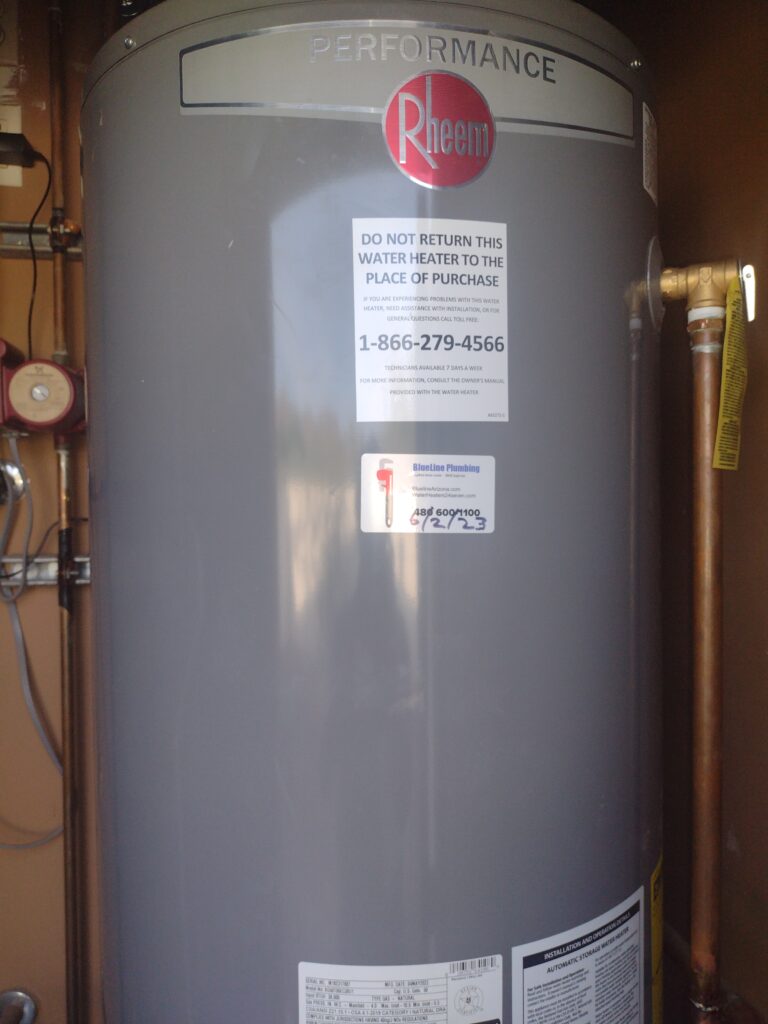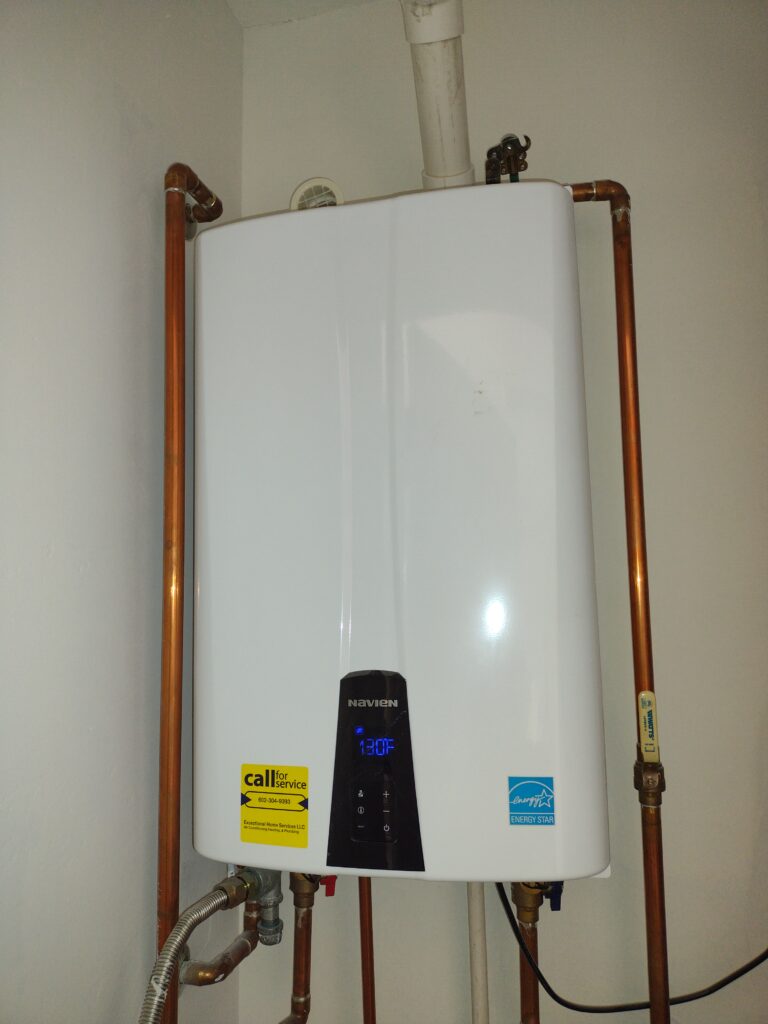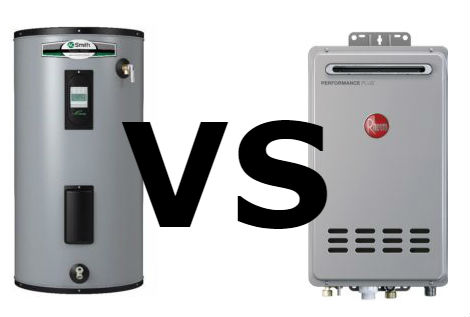Water Heater Replacement
When your water heater has come to the end of it's service...
Your water heater plays a crucial role in various household tasks, such as washing clothes, doing dishes, and taking a refreshing shower. However, when they malfunction or their efficiency declines, it becomes necessary to consider repairs or potentially replacing them. Blueline Plumbing offers you a range of options to address these issues.
Tank Water Heaters
Tank-type water heaters offer several advantages that make them a popular choice for residential and commercial applications. One of the primary benefits is their relatively low upfront cost compared to other types of water heaters, making them a cost-effective option for homeowners and businesses alike. Additionally, tank-type water heaters are straightforward to install and compatible with existing plumbing systems, minimizing installation time and hassle.
Another advantage of tank-type water heaters is their ability to provide a consistent supply of hot water on demand. By storing a predetermined volume of hot water in the tank, these heaters ensure that hot water is readily available whenever it’s needed, making them suitable for households with moderate to high hot water demand. This continuous supply of hot water is particularly beneficial for larger families or properties with multiple bathrooms and appliances requiring hot water simultaneously. Add a circulation pump, and you have the fastest possible delivery of hot water to your point of use.
Furthermore, tank-type water heaters are relatively simple to maintain and repair, with readily available replacement parts and straightforward troubleshooting procedures. Regular maintenance, such as flushing the tank to remove sediment buildup, can help extend the lifespan of the water heater and maintain its efficiency over time. With proper care and maintenance, tank-type water heaters can provide reliable hot water for many years, offering homeowners and businesses peace of mind and comfort.

Add a circulation pump, and you have the fastest possible delivery of hot water to your point of use.

Tankless water heaters offer longer lifespan compared to traditional tank-type heaters, with many models boasting warranties of up to 20 years or more.
Tankless Water Heaters
Tankless water heaters offer several advantages that make them an attractive option for homeowners and businesses seeking energy-efficient and space-saving hot water solutions. One of the key benefits of tankless water heaters is their on-demand hot water production, which eliminates the need for a storage tank. Instead of continuously heating and storing hot water, tankless heaters heat water instantly as it passes through the unit, providing a virtually unlimited supply of hot water whenever it’s needed. This ensures greater energy efficiency and eliminates standby heat loss, resulting in lower energy bills and reduced environmental impact.
Additionally, tankless water heaters are compact and space-saving, making them ideal for installations in tight spaces or smaller properties where space is at a premium. Their compact design allows for flexible installation options, including mounting on walls or in confined areas, freeing up valuable floor space for other purposes. This makes tankless water heaters particularly well-suited for modern, minimalist, or space-constrained living environments.
Furthermore, tankless water heaters offer longer lifespan compared to traditional tank-type heaters, with many models boasting warranties of up to 20 years or more. Their durable construction and advanced technology ensure reliable performance and minimal maintenance requirements, saving homeowners time and money over the long term. With their energy efficiency, space-saving design, and long lifespan, tankless water heaters offer a compelling solution for those seeking to upgrade their hot water system to a more efficient and environmentally friendly option.
Pros and Cons of Tank Water heaters
Pros:
Inexpensive. Tank water heaters are not expensive. Especially when replacing a similar unit.
Storage. Tank water heaters always have a reserve of hot water that is there for use even when the power is out. Depending, of course, on how long it’s been out. The average tank water heater will keep the water within hot for at least 24 hours or longer.
Modular. Changing out a tank water heater is straight forward. Even if the replacement water heater is a different brand.
Easy to repair. A tank water heater is easy to diagnose and repair by almost any knowledgeable plumber or tradesperson.
Cons:
Water damage. A tank water heater leak can damage surrounding structures. Flooring, walls, etc. This may not be a catastrophic concern if the tank water heater is outside, or in a mechanical room.
Limited hot water. A tank water heater can simply run out of hot water with heavy use. Rapid recovery water heaters can mitigate this problem. If space allows, a larger volume water heater can replace a smaller unit.

Pros and Cons of Tankless Water Heaters
Pros:
Endless hot water. You cannot run out of hot water if you have a tankless water heater. This is a benefit if you have heavy usage at given points in the day. Or, if you have a large modern bathtub, or are planning to get one.
Space. A tankless water heater is the size of a suitcase. It uses less space than a tank water heater.
Life span. Tankless water heaters last longer than tank water heaters. Most have a longer (limited) warranty.
Cons:
Power. Tankless water heaters will not operate when the power is out. There may be a small reserve tank in a tankless unit, but no water can be heated after it is used, if the power is out. This applies to gas tankless water heaters as well.
Complicated. A tankless water heater has many components that may not be readily available if worn or broken. A technician, rather than a plumber, may be needed to repair a tankless.
Pressure balance. A pressure balance plumbing fixture, (shower valve, kitchen faucet, etc.) is designed to prevent scalding. These fixtures (you have some in your home) limit the performance of tankless water heaters by restricting flow. Tankless water heaters are all about flow. You will always get hotter water in your laundry sink than in your shower.
Venting. If you are planning on replacing a gas tank-type water heater with a gas tankless type unit, your vent (the ducting that extends from the top of your gas water heater into the ceiling above) may not be compatible with a condensing gas tankless unit. Replacing the vent will carry additional costs.
